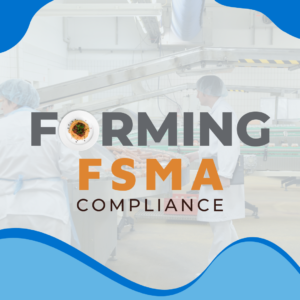FORMing FSMA Compliance
A rundown of the FDA’s new 204(d) proposal and how to prepare for its requirements.
Outline:
What is the new Regulation 204(d)
Defining KDEs & CTEs
What Food companies should expect
When/How to adjust to the changes
Moving forward with the right Tools
Today, we will provide a short rundown of how your operations can begin Forming FSMA Compliance by utilizing KDEs proposed by the FDA. The Food and Drug Administration recently announced its proposed addition of section 204(d) to the FSMA Act for increased traceability of recordkeeping due to an influx of recalls. This section is a key component of the FDA’s New Era of Smarter Food Safety Blueprint and is aimed at increasing transparency across the supply chain. The Food Safety Blueprint focuses on 4 key components including (1)Tech-enabled Traceability, (2) Smarter Tools and Approaches for Prevention and Outbreak Response, (3) New Business Models and Retail Modernization, and (4)Food Safety Culture.
Section 204(d) under this Blueprint would require more stringent data collection and management methods that ultimately provide insight to foods that cause foodborne illness or other credible threats of health consequence. How? The core of the proposal is geared toward those companies on the Food Traceability List to establish and maintain ongoing Key Data Elements (KDEs) along with Critical Tracking Events (CTEs).
A Critical Tracking Event is any occurrence during growing, receiving, creating, processing, transforming or shipping a product. Within each of these processes have to be close records kept of key data otherwise known as a KDE or Key Data Element. The majority of KDE information is logged and stored in paper formats that are difficult to access on short notice, causing companies to fall short of compliance. Some companies have transferred paper to excel spreadsheets or other digital copies to increase efficiency. KDEs can be industry or process specific and additional KDEs will most likely be added to the FDA’s list in the near future.
This affects food companies in many ways, the most important being how they collect and maintain key data for food safety and quality. The new requirements propose a more data-driven approach that gives producers, consumers and auditors confidence in the safety and quality of company products and/or facilities. Records that have been stored safely must be able to be provided to the FDA within 24 hour notice in a sortable spreadsheet format (a short amount of time to track down what could be a heaping pile of paper and transform it). Although there are exemptions for some farms and smaller processors, etc., more regulations will come and ultimately, affect all food businesses in the future.
Changes to FSMA are coming faster each time there is a new recall and while there are additional costs to managing this more effectively, it is much easier than a recall on your product or other detrimental health issues. As the FDA continues to push stronger guidelines on traceability, recordkeeping, and digital technologies to ensure food safety, we must take a closer look at this and find a strategy that works for each business’ compliance. Becoming a more proactive organization with food safety processes is a great way to see immediate benefits of increased confidence, employee morale, and consumer satisfaction. Producers are able to identify and understand their pitfalls easier by tracking and tracing KDEs throughout all processes. CTEs, KDEs, digital strategy, these are all things that need to be clear as new food safety requirements emerge and are enforced.
A key strategy to adapt to the ever-evolving changes is to create a roadmap of how your processes should evolve with these requirements. This roadmap should include how you will accomplish each task at every level. A good way to ensure compliance with these requirements and fulfill short-notice requests is to implement digital technologies that allow you to scale quickly with your growth and the FDA’s.
Digital Forms and management not only eliminates the need to chase down paper trails, but allows the organization to take on a digital mindset that ultimately empowers employees with accurate, real-time tools. Compliance with new requirements is one of the biggest challenges for the food industry, but doesn’t have to be yours this year.
See how you can simplify recordkeeping with Digital Forms.
Other Popular Blog Posts:
